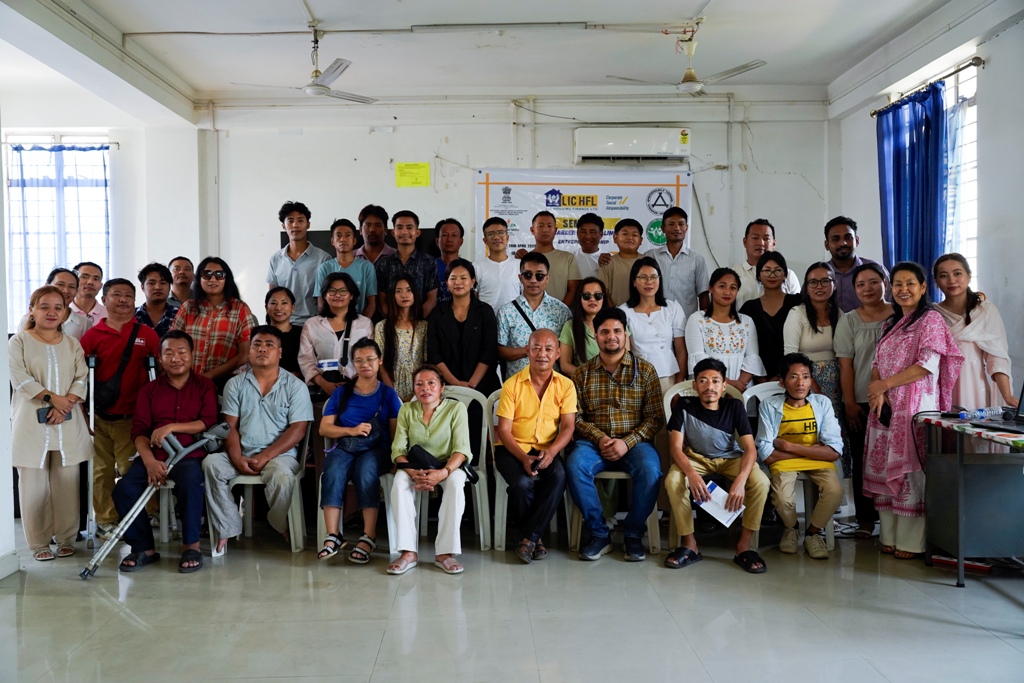WEDNESDAY, APRIL 30, 2025
- Home
- Persons with Disabilities get insights on livelihood opportunities
Persons with Disabilities get insights on livelihood opportunities
Published on Apr 26, 2025
By Veroli Zhimo
Share

Participants and resource persons at the seminar in Dimapur on Saturday. (EM Images)
- DIMAPUR — To strengthen awareness and open up new livelihood opportunities, a seminar on career counseling and entrepreneurship for Persons with Disabilities (PwDs) was held on Saturday at the District Hospital’s conference hall, Dimapur.
- Organised by Prodigals’ Home under the LIC HFL Sarthak Initiative (a corporate social responsibility programme), in collaboration with the office of the State Commissioner for Persons with Disabilities (SCPD) and the National Career Service Centre for the Differently Abled (NCSC-DA), the seminar marked an important step in connecting PwDs to services, schemes and networks for sustainable empowerment.
- The event saw participation of 32 PwDs identified through a community-based survey launched by Prodigals’ Home in December 2024 across Dimapur, Chümoukedima and Niuland districts focusing on adults aged 18 to 40 years.
Also read: Advisor Nyuthe urges to invest in education
- Addressing the gathering, Ela K, director of Prodigals’ Home, explained that the initiative was intended for PwDs, who are engaged in any form of livelihood generation.
- She shared that despite logistical and outreach challenges during the survey, the field experience had been “very motivating” for the team and reinforced the need for more visible inclusion efforts.
- “This is not just about accessing schemes, but about encouraging persons with disabilities to come forward, build networks among themselves, and ensure they are counted and included in government figures,” Ela said.
- She pointed out that the perception that there are “very few PwDs” often persists because many remain hidden from formal systems. Visibility is the first step towards inclusion, she added.
-
- Financial assistance and entrepreneurship
- The seminar featured technical sessions including an introduction to the facilities provided by NCSC-DA, which was established in Dimapur in 2022 under the Ministry of Labour and Employment. Resource persons explained how PwDs can access career counseling, vocational training and placement support tailored to meet their specific needs.
- Vipin Kumar Mishra, rehabilitation counselor, highlighted vocational training options available for PwDs, who may not be suited for formal mode of training due to either severity of disability or poor educational backgrounds. Training areas include commercial/secretarial practice, computer applications with trainees eligible for monthly stipends on INR 2500 during the training period.
- He highlighted various business ideas that PwDs can pursue such as corrugated box manufacturing, food-based businesses including cloud kitchens, tiffin services, food trucks, CCTV installation and pet-sitting, among others.
- Mishra also highlighted various financial empowerment schemes under the National Divyangjan Finance and Development Corporation (NDFDC) such as the Divyangjan Swavalamban Yojana, which provides loans at concessional rates for starting or augmenting income-generating activities.
- Another scheme was the Vishesh Microfinance Yojana (VMY), which provides need-based finance at a reasonable rate of interest to pursue small/ micro business through partner institutions like the NBFC-MFI, Section-8-MFI and NGO-MFI, SHG federations, state government missions and other state-level organisations.
- Mishra also explained the avenues available under the Pradhan Mantri Mudra Yojana (PMMY), where collateral-free loans up to INR 10 lakh can be accessed by small and micro-entrepreneurs.
- Participants were briefed on the three categories of Mudra loans — Shishu, Kishore and Tarun — and encouraged to visit the NCSC-DA for training or personalised skill assessment and guidance.
- In a session on ‘Disability sensitisation and rehabilitation,’ Abdul Saleem TK, rehabilitation officer, addressed widespread myths including assumptions that PwDs are dependent, incapable of work or unsuitable for family life. He explained the evolution from the traditional medical model of disability, which focuses on the individual as a problem to be “fixed” to the social model, which identifies societal barriers as the real obstacles to full participation.
- Saleem outlined the rights of PwDs under Rights of Persons with Disabilities (RPwD) Act, 2016, covering areas such as inclusive education, reservation in higher education and government jobs, accessibility mandates and social security provisions.
- Highlighting ongoing challenges such as limited public transport options, poor access to assistive devices and exclusion from decision-making processes, he emphasised that solutions must centre on accessibility, rights and inclusion.
- He also noted concerns expressed by employers regarding hiring PwDs, citing fears about productivity and the perceived burden of training. These, he said, must be addressed through sustained awareness campaigns and changes in workplace culture.
- Delivering the vote of thanks on behalf of the SCPD office, Ashe Kiba reflected on the evolving landscape of disability rights advocacy in Nagaland.
- “We are still the first generation of PwDs standing for our rights. In earlier days, it was only NGOs and others who fought on our behalf,” she said.
- Kiba discouraged a culture of dependency and urged participants to pursue empowerment through skills and hard work.
- “Non-disabled individuals do not simply get everything because they are able-bodied. They get it because they skill their abilities and work for it,” she stated.
- “Do not take advantage of your disability. Identify your ability, skill it and work for what you want. Our disability does not define us; our ability does,” she emphasised.

